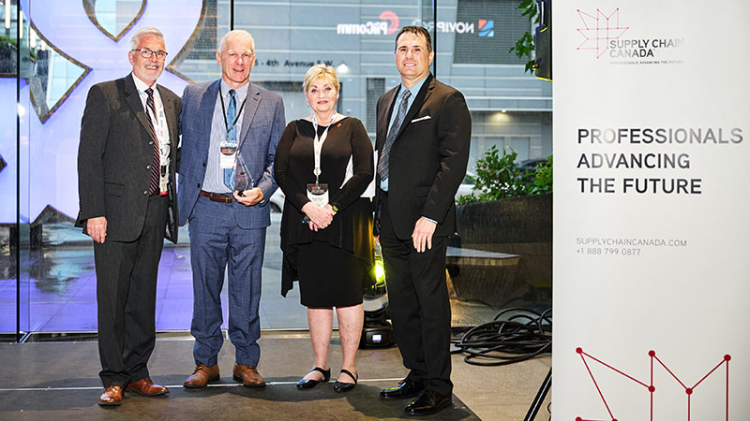For over 30 years, Dr. Don Patterson has quietly shaped how goods are moved, contracts are signed and projects are built.
Now, the long-time instructor in the master of business administration (MBA) program at the University of New Brunswick's (UNB) Saint John campus has been recognized with Canada's highest honour in this field.

Dr. Don Patterson is the first New Brunswicker to receive the prestigious FSCMP designation. The award recognizes decades of leadership and excellence in supply chain management logistics, contracts and procurement across multiple industries.
Patterson received the Fellow Supply Chain Management Professional (FSCMP) designation from Supply Chain Canada at its annual general meeting on June 12. The award is the most exclusive recognition in Canadian supply chain leadership. It has been given only 65 times since 1919.
Patterson is the first New Brunswicker to receive the honour. He called the recognition both humbling and gratifying.
"From a professional perspective, it's a culmination. It's a big achievement because your peers recognize you."
Patterson's career has taken him from shipyards to oilfields to government offices. He has worked on NATO-standard warships, helped build Canada's largest refinery, and managed procurement for a metallurgical coal project in northern British Columbia, which involved interested parties in London, Brisbane and Vancouver.
He has taught supply chain management courses since the 1990s and first taught at UNB in 2014.
Patterson didn't set out to become a supply chain management expert. Fresh out of university, he joined the now defunct Saint John Shipyard as a risk analyst on a $6 billion Canadian Navy frigate program.
He quickly discovered that most of the project's risks were tied to procurement, contracts and delivery. That led him into supply chain management, where he began buying materials from around the world.
He later joined Irving Oil during a major refinery expansion and helped manage procurement for one of the most significant industrial projects in the country. From there, he worked in mining, public infrastructure and consulting, always with a focus on supply chain systems and strategy.
Supply chain management is often invisible to the average person, but it touches every part of life.
"I brought a sandwich for lunch today," he said. "The supply chain for that sandwich begins in a farmer's field."
From seed to harvest, milling to baking, packaging to retail, every step involves contracts, transportation, inventory and planning.
"Each one of those steps in that supply chain has its own supply chain," he said, noting that other supply chains, such as building and fueling the farmer's equipment, will intersect with and affect the seed-to-bread supply chain that leads to the sandwich.
Patterson said the public often underestimates the global and interconnected nature of these systems. A six-day blockage of the Suez Canal in 2021 caused weeks of shortages in North America and Europe.
"It's a bit of a paradox," he said. "The better we get at managing our supply chain, the more delicate it becomes."
Patterson views geopolitical and economic challenges, such as the current trade dispute with the United States, as opportunities for growth.
"This [dispute] is another opportunity for Canadians to strengthen our supply chain."
He believes the key to resilience lies in flexibility and analysis.
Companies now use sophisticated planning tools to simulate disruptions and develop adaptable processes. However, unexpected events, such as pandemics or trade disputes, can disrupt even the most advanced systems.
In the classroom, he draws on real-world examples to bring theory to life.
"I use a textbook to help keep them grounded," he said, "but then I'll use a local example. I'll use Moosehead Breweries, Irving Oil or Cooke Aquaculture," he said.
"Supply chain management creates many opportunities for [a student] to grow, to learn and to become academically stronger," he said.
Since Patterson teaches graduate level students, often with some experience in the world, he also learns a great deal from them.
His research has focused on how organizations perceive the value of supply chain management, seeking to educate executives and frontline staff alike on the contributions of procurement, logistics and planning to overall success.
"You take it for granted," he said. "But somebody made sure the right part was in the warehouse."
Patterson has also made a mark as a volunteer. When his children were in minor hockey, he volunteered as an ice scheduler for the Kennebecasis Valley Minor Hockey Association.
Faced with too many teams and not enough ice time, he used his experience dealing with government to lead a push for new infrastructure. That effort led to the construction of the qplex Arena in Quispamsis, with support from all three levels of government.
He continues to volunteer with local organizations, helping students find employment and build connections. Many of the people Patterson has hired over the years came from his classes.
"I'm always trying to recruit good people," he said. "When I have a classroom full of people, I can understand by the end of the term who's keen."
Patterson said the supply chain management field offers endless opportunities to learn and grow professionally.
"The skills are pretty transferable across industries," he said. "I don't think there's any kind of learning that doesn't help you in some fashion."
He hopes his legacy will be twofold: helping students succeed and raising the profile of supply chain management as a strategic function.
"If I can just help the profile of supply chain management to let organizations better appreciate and understand and use what they have to offer, then I think that will be a success."













